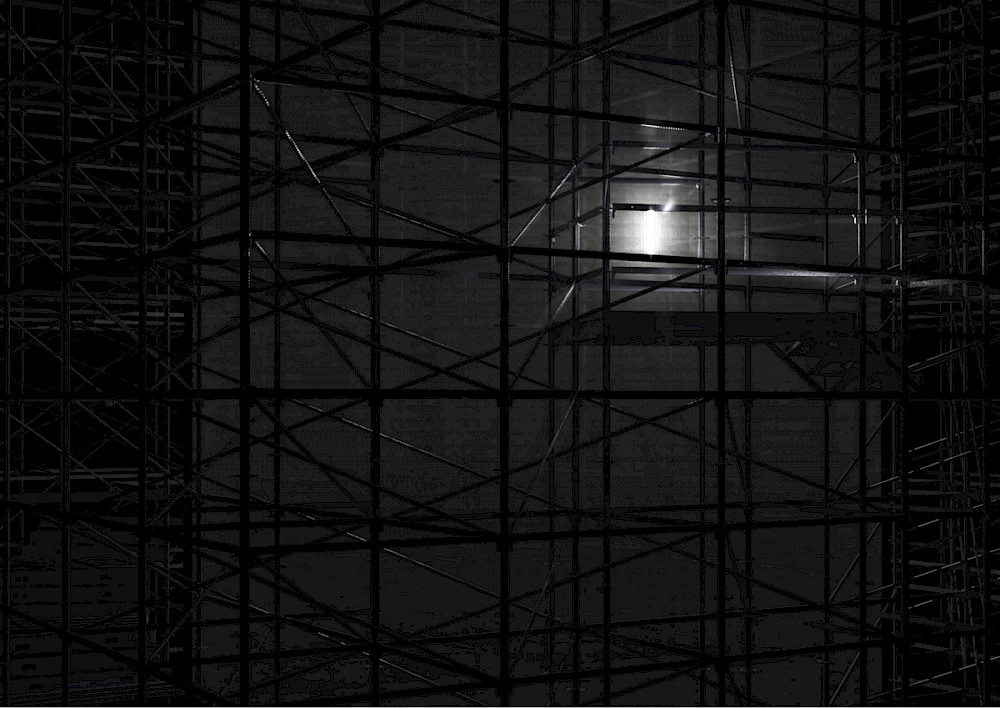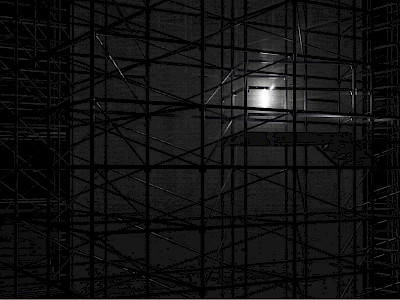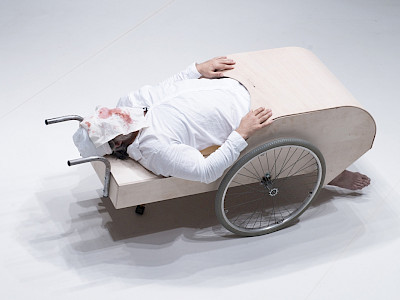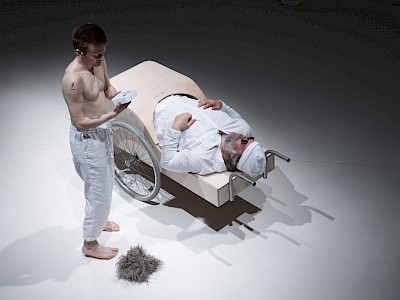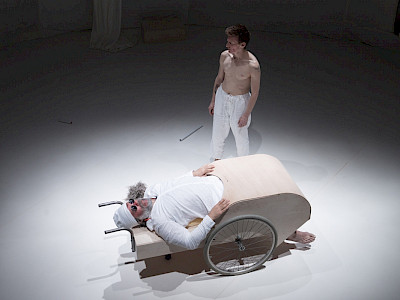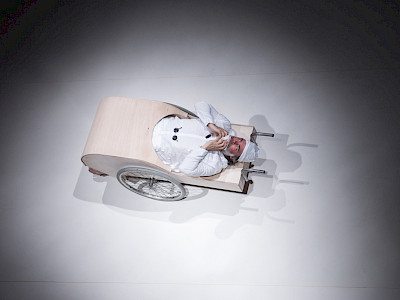16 — 21.05.2017
Can art change the world? For Tania Bruguera, the answer is yes. Famous for her uncompromising work combining activities, performances and installations, the Cuban artist and activist questions, often in connection with her homeland’s turbulent history, the control that political and economic power exerts on our everyday lives. Her work deals with individual experience as a reflection of a collective history and memory. Her actions encourage the audience to confront themselves with notions of anxiety, frailty and dependence. At the Kunstenfestivaldesarts, Bruguera is creating a piece for theatre for the first time. Endgame is a staging of the famous one-act play by Samuel Beckett, a post-apocalyptic play on death and despair in its purest form. For Beckett, there was nothing funnier than unhappiness. Building on this momentum, Bruguera reveals a play about domination, power and the limits of our limitless freedom that is universal in scope.
Important information for spectators: The performance takes place in a scaffolding structure. The audience enters the installation and follows the show standing upright. For your comfort we advise not to wear high-heeled shoes, and leave your handbags, umbrellas and jackets in the cloakroom. The full English text will be on display at the ticket counter. The entrance and ticket counter are located at the back of the venue, 27 Rue Saint-Pierre.
See also
Artist Talk
Endgame
Endgame by Samuel Beckett is a one-act play with four characters. Written in French [Fin de partie], it was first performed at the Royal Court Theatre in London in a production that opened on 3 April 1957. Beckett himself later translated the play into English. Along with such works as Waiting for Godot, Endgame is commonly considered to be among Beckett’s most important works.
Characters
Hamm – a blind man unable to stand.
Clov – Hamm’s servant taken in by Hamm as a child; unable to sit.
Nagg – Hamm’s father; has no legs and lives in a dustbin.
Nell – Hamm’s mother; has no legs and lives in a dustbin next to Nagg.
Interpretation
The play portrays a universe that is nearing its end but that could just continue repeating itself. The end that everyone seems to be moving toward is both certain and elusive. The setting and the situation suggest an underground bomb shelter, possibly after a nuclear disaster. Viewers identify the desolate stage as being the post-nuclear apocalypse, the ruins of the Second World War, or the ravaged landscape of Normandy that Beckett drove through in 1945 when serving as a volunteer ambulance driver. The atmosphere of destruction and desolation is also a register of the distress Beckett felt at the time of writing. In 1954 he discovered that his brother Frank had terminal lung cancer. Beckett wrote the play during the agonizing months of illness and death of his brother, causing him anguish, which is surely evident in the preoccupation with ‘the end’ that haunts the play.
Endgame exhibits an awareness of absurdity and of the meaninglessness of the human condition, while also attempting to construct meaning through language and imagination. It represents a cyclical pattern as well as an unavoidable linear progression toward nothingness.
Beckett is often portrayed as the last modernist, but Endgame is not an autobiography. Beckett moved beyond self-portrayal to a modernist impersonality. Like much of the phlegmatic writer’s work, the play purposely withholds any clarity and certainty of reference, just as it withholds any allegiance to post-war attempts to process modern historical experience. In the play, it is not just material things that are scarce. Less effable but more fundamental, is the erosion of meaning and of a value system that a sense of tragedy requires. The character’s view on life is bleak. Parents are kept in rubbish bins, the death of the mother is barely worth a mention, and the sight of a child provokes a brutal response. There are layers of parody and black comedy in the play, and the characters display a mesmerizing vitality and humour despite their stripped- down lives. But also present is a strongly subversive and shocking refusal to value life, family, and progress. Just as Beckett broke down the conventions of traditional theatre, so does Endgame bring the ancient dramatic tragedy into absurd modernity.
Direction
Tania Bruguera
Text
Endgame by Samuel Beckett
Architects
Dotan Gertler Studio
With
Brian Mendes, Jess Barbagallo
Voices
Jacob Roberts, Chloe Brooks
Light design
Rui Monteiro
Sound design
Rui Lima & Sérgio Martins
Sound engineer
Pedro Lima
Sound recording
Luke Martinez
Direction assistant
Mitchell Polonsky
Technical direction
Patrícia Gilvaia
Production
BoCA Biennial (Lisbon/Porto)
Production direction
Ana Rita Osório
Executive production
Francisca Aires
Thanks to
John Romão, Christophe Slagmuylder, Philippe Quesne, The Radcliffe Institute for Advanced Studies, Harvard College TDM, James Stanley, Achy Obejas, Tricia Van Eyck & MCA Chicago, Bob Wilson & The Watermill Center, Estudio Bruguera, New York City Players, Nicholas Elliot, Katiana Rangel, Regina Vorria, Alessandra Saviotti
Presentation
Kunstenfestivaldesarts, Hotel Marivaux
Co-production
Kunstenfestivaldesarts, São João National Theatre (Porto), Colectivo 84 (Lisbon), Théâtre Nanterre-Amandiers (Nanterre), Festival d’Automne à Paris, International Summer Festival Kampnagel (Hamburg), Estudio Bruguera
With the support of
Fondation d'Entreprise Hermès, in the framework of the New Settings programme
